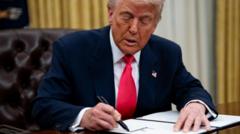Despite the expectation that Congress will not sanction the department's complete closure, Trump has indicated plans to delegate more education responsibilities to state and local governments. He praised his newly appointed Secretary of Education, Linda McMahon, and reiterated his hopes that she would be the last to serve in this position, as he aims to cut down on federal oversight in education. The executive order lacks specifics on which programs may face elimination, but the administration has previously been accused of prioritizing cuts over the needs of students, particularly those from low-income backgrounds.
In response to Trump's plans, various education advocates and organizations have raised concerns about the implications for the educational systems, emphasizing that most funding for public schools derives from state and local sources, not federal funds. The education department, established in 1979, has been under scrutiny for its role in administering federal student loans and ensuring equitable access to education.
As the administration attempts to navigate through its proposed restructuring, it faces opposition from educators and unions, who argue that the proposed cuts would adversely affect students in need. The decision to dismantle or significantly alter the education department represents a long-standing conservative aspiration, which hasn’t materialized since Reagan's presidency, highlighting the contentious nature of education policy in the current political climate.
Efforts by the Trump administration to promote sweeping changes within various government sectors, assisted by tech mogul Elon Musk, are set against a backdrop of escalating debates over educational values and fiscal policies in the U.S. The staff layoffs and potential reallocation of education programs could reshape the landscape of American education in the coming years, as the administration strives to fulfill its goal of reducing federal influence over education.
In response to Trump's plans, various education advocates and organizations have raised concerns about the implications for the educational systems, emphasizing that most funding for public schools derives from state and local sources, not federal funds. The education department, established in 1979, has been under scrutiny for its role in administering federal student loans and ensuring equitable access to education.
As the administration attempts to navigate through its proposed restructuring, it faces opposition from educators and unions, who argue that the proposed cuts would adversely affect students in need. The decision to dismantle or significantly alter the education department represents a long-standing conservative aspiration, which hasn’t materialized since Reagan's presidency, highlighting the contentious nature of education policy in the current political climate.
Efforts by the Trump administration to promote sweeping changes within various government sectors, assisted by tech mogul Elon Musk, are set against a backdrop of escalating debates over educational values and fiscal policies in the U.S. The staff layoffs and potential reallocation of education programs could reshape the landscape of American education in the coming years, as the administration strives to fulfill its goal of reducing federal influence over education.




















